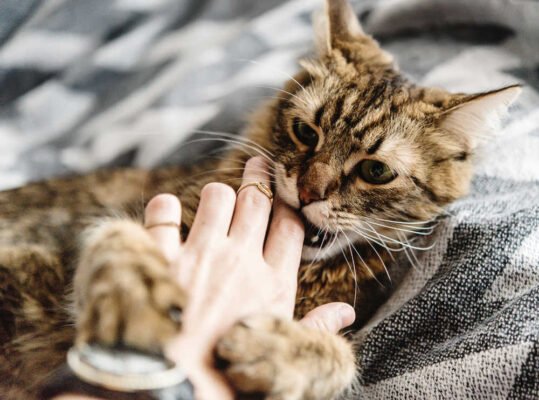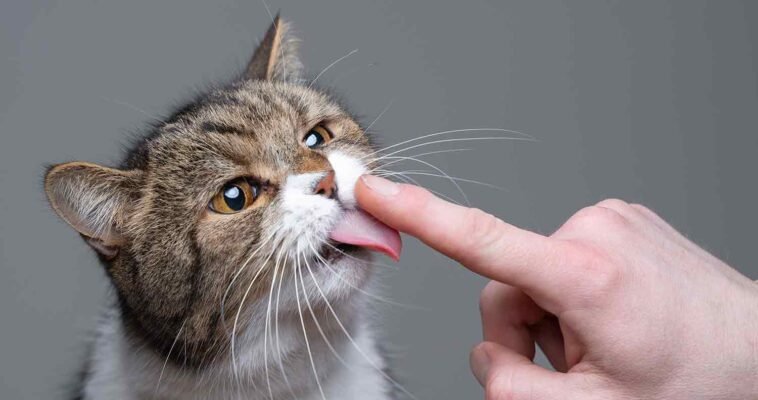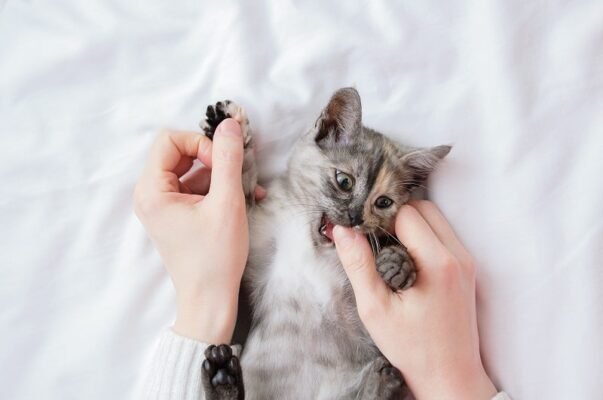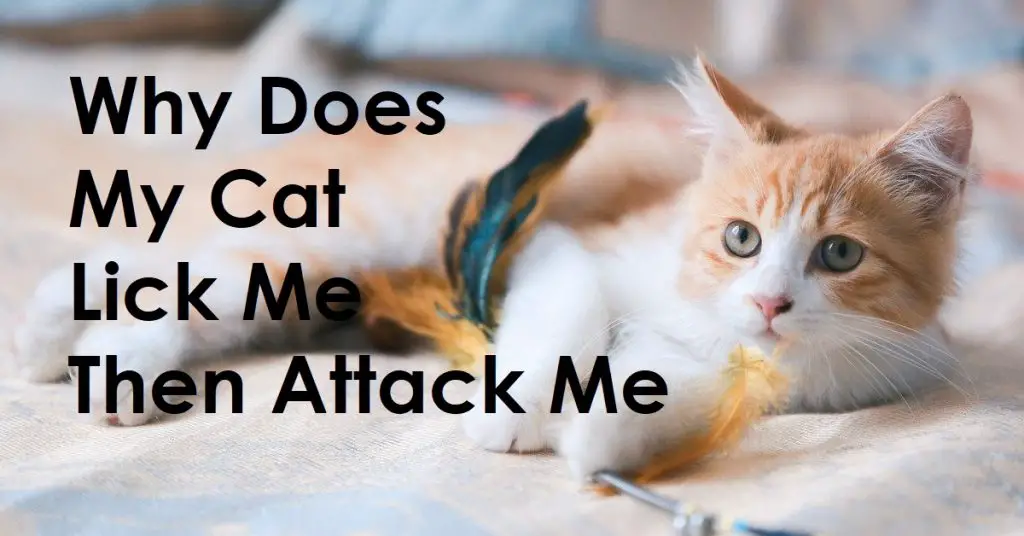About kittens
why does my cat lick me then bite me
why does my cat lick me then bite me
The Science Behind Cat Licking and Biting: Understanding Feline Behavior
Why does my cat lick me then bite me? Cats are known for their independent and sometimes unpredictable behavior. As cat owners, we often find ourselves wondering why our furry feline friends do certain things, such as licking and biting us. While it may seem like a strange and even frustrating behavior, there is actually a scientific explanation behind it. In this article, we will delve into the science behind cat licking and biting, and gain a better understanding of our beloved pets’ behavior.
Firstly, it is important to understand that cats are natural groomers. In the wild, cats spend a significant amount of time grooming themselves and other cats in their social group. This behavior is not only for hygiene purposes but also serves as a way to bond and show affection. When a cat licks you, it is their way of showing that they trust and care for you. It is also a way for them to mark you as a part of their social group.
However, the licking behavior can quickly turn into biting, leaving many cat owners confused and even hurt. The truth is, cats have a sensitive sense of touch, and their tongues are designed to feel even the slightest of textures. When a cat licks you, they are also using their tongue to explore and gather information about you. This is why they may lick your hand, then suddenly bite it. They are simply trying to understand and interact with you in their own way.
why does my cat lick me then bite me?
Another reason for this behavior is that cats have a natural instinct to hunt and play. When they are kittens, they learn to hunt and play by biting and scratching their littermates. This behavior carries on into adulthood, and they may see you as their playmate. So when your cat starts licking and then biting you, it could be their way of initiating playtime. It is important to redirect this behavior by providing them with appropriate toys and playtime to satisfy their hunting instincts.
Furthermore, cats are also known for their territorial nature. They have scent glands on their tongues, which they use to mark their territory. When a cat licks you, they are also leaving their scent on you, claiming you as a part of their territory. This is why they may become possessive and even aggressive if they see another cat or animal getting too close to you. It is their way of protecting their territory and showing their dominance.
Additionally, cats are highly sensitive to changes in their environment and routine. If you have recently introduced a new pet or family member into the household, your cat may start exhibiting this licking and biting behavior. This is their way of coping with the change and asserting their dominance. It is important to give your cat time to adjust and provide them with extra attention and reassurance during this transition period.

5 Possible Reasons Why Your Cat Licks You and Then Bites You
Cats are known for their independent and sometimes unpredictable nature. They can be loving and affectionate one moment, and then suddenly turn into a biting machine the next. As a cat owner, you may have experienced this behavior where your cat licks you and then bites you. It can be confusing and even painful, but there are reasons behind this behavior. In this article, we will explore five possible reasons why your cat may be exhibiting this licking and biting behavior. Why does my cat lick me then bite me?
1. Grooming Instinct
Cats are known for their cleanliness and grooming habits. They spend a significant amount of time grooming themselves, and they may extend this behavior to their human companions. When your cat licks you, it may be a sign of affection and a way for them to show that you are part of their family. However, sometimes this grooming behavior can turn into a bite. This could be because your cat may have accidentally nipped your skin while grooming or they may have become overstimulated and reacted with a bite. It is essential to pay attention to your cat’s body language and stop the grooming session if they start to show signs of irritation.
2. Overstimulation
Cats are sensitive creatures, and they can easily become overstimulated. When your cat is in a state of overstimulation, they may exhibit behaviors such as biting, scratching, or even running around frantically. This can happen when you are petting your cat, and they suddenly turn around and bite you. It is their way of saying that they have had enough and need some space. It is crucial to respect your cat’s boundaries and give them some time to calm down before trying to interact with them again.
3. Playful Behavior
Cats are natural hunters, and they have a strong instinct to play. When your cat licks you and then bites you, it could be a sign that they want to play. They may see your hand or feet as a toy and try to engage in a play session. However, it is essential to discourage this behavior and redirect their attention to appropriate toys. This will not only prevent any accidental bites but also help your cat understand what is acceptable play behavior.
4. Attention Seeking
Cats are social animals, and they crave attention from their owners. When your cat licks you and then bites you, it could be their way of seeking attention. They may have learned that this behavior gets a reaction from you, and they continue to do it to get your attention. It is essential to not reward this behavior and instead give your cat attention when they are calm and not exhibiting any biting behavior.
5. Medical Issues
In some cases, your cat’s licking and biting behavior may be due to an underlying medical issue. Cats can experience dental problems, skin allergies, or even pain that can cause them to act out in this manner. If you notice that your cat’s licking and biting behavior is excessive or out of character, it is essential to take them to the vet for a check-up. They will be able to rule out any medical issues and provide appropriate treatment if needed.

There are various reasons why your cat may lick you and then bite you. It could be a sign of affection, overstimulation, playfulness, attention-seeking, or even a medical issue. As a responsible cat owner, it is crucial to understand your cat’s behavior and address any underlying issues. With patience and proper training, you can help your cat learn appropriate ways to show affection and prevent any unwanted biting behavior. Remember to always respect your cat’s boundaries and provide them with a safe and loving environment.
How to Train Your Cat to Stop Licking and Biting: Tips and Techniques
Cats are known for their independent and sometimes unpredictable nature. As much as we love our feline friends, there are times when their behavior can leave us scratching our heads. One common behavior that many cat owners struggle with is the combination of licking and biting. You may have experienced this yourself – your cat will start by affectionately licking you, only to suddenly switch to biting. This can be confusing and even painful, but there are ways to train your cat to stop this behavior. In this article, we will explore the reasons behind why cats lick and bite, and provide tips and techniques for training your cat to stop.
Firstly, it is important to understand that licking and biting are natural behaviors for cats. In the wild, cats use these behaviors to groom themselves and their fellow felines. When a cat licks you, it is a sign of affection and trust. However, when the licking turns into biting, it can be a sign of overstimulation or playfulness. Cats have a natural instinct to hunt and play, and sometimes they can get carried away and use their teeth. It is also possible that your cat is trying to communicate something to you through this behavior. For example, they may be trying to tell you that they are hungry or that they want attention.

Reasons for this behavior
Now that we understand the reasons behind this behavior, let’s explore some tips and techniques for training your cat to stop. The first step is to identify the triggers that lead to your cat’s licking and biting. Is it during playtime? Is it when you are petting them? Once you have identified the triggers, you can work on redirecting their behavior. For example, if your cat starts biting during playtime, try using toys instead of your hands to play with them. This will help them understand that biting is not acceptable behavior.
Another effective technique is to use positive reinforcement. When your cat licks you without biting, praise them and give them a treat. This will reinforce the behavior you want to see and encourage them to continue licking without biting. On the other hand, if your cat starts biting, immediately stop the interaction and walk away. This will show them that biting leads to the end of playtime or attention, and they will learn to associate biting with a negative consequence.
why does my cat lick me then bite me
Consistency is key when it comes to training your cat. It is important to be patient and consistent with your training methods. Cats are creatures of habit, and it may take some time for them to unlearn their behavior. It is also important to avoid punishment as a form of training. This can lead to fear and anxiety in your cat, which can worsen their behavior.
In addition to these techniques, there are also some preventative measures you can take to reduce the likelihood of your cat licking and biting. One way is to provide your cat with plenty of toys and scratching posts. This will give them an outlet for their natural hunting and playing instincts. You can also try using a bitter spray on areas where your cat tends to bite, such as your hands or feet. The unpleasant taste will discourage them from biting.
In conclusion, cats licking and biting can be a frustrating behavior for cat owners. However, with patience, consistency, and positive reinforcement, you can train your cat to stop this behavior. Remember to identify the triggers, redirect their behavior, and use positive reinforcement. With time and effort, your cat will learn to show their affection without the painful bites.

